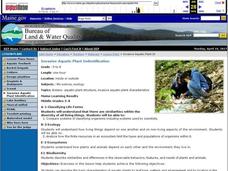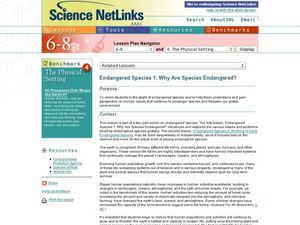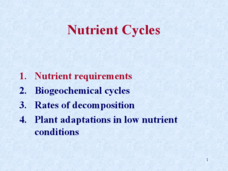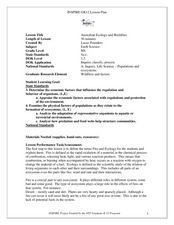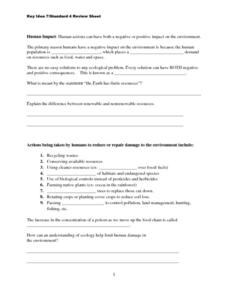Curated OER
Jeopardy 8th Grade (Science)
There are so many topics touched upon in this Jeopardy-style science game, that it is difficult to classify! The categories include electricity, matter, ecology, earth and space, and scientific investigation. This would best be used at...
Kentucky School for the Deaf
Levels of Organization within an Ecosystem
From tiny organisms to entire biomes, young scientists examine the interdependent relationships tying all living and non-living things together with this collection of ecology resources.
Curated OER
Beetle Collection and Release
Students investigate plants and compare them to the purple loose strife. As they observe the plants they predict possible impacts on plant populations based on their observations. They work in groups and present their findings to the class.
Curated OER
Ecological Relationships
Middle schoolers identify ecological elements and their factors on species, populations and food webs. They analyze ecosystems for these elements and research how these factors influence species survival rate. Predictions on conditions...
Curated OER
Zebra Mussel Population Simulation
Young scholars are taught how to format and enter data into an Excel spreadsheet. They make a graph, and interpret graphed data. Students discuss the possible impacts of zebra mussels on the Hudson river. They graph zebra mussel data.
Chicago Botanic Garden
Leaf Litter Ecology Lab
Some organisms spend their entire lives in leaf litter. The third in a series of six is a great lesson exploring the community of leaf litter. Groups gather and then spread leaf litter over white paper and remove leaves/twigs while...
Curated OER
Personal Ecosystem
Young scholars build an aquatic ecosystem using large glass pickle jars. In this ecology instructional activity, students build and ecosystem then observe and collect data on the habitats. In this long term project young scholars...
Curated OER
Interactions Among Living Things
Students role play predators and prey, classify organisms as predator or prey, and describe factors that affect population growth and size.
Curated OER
Invasive Aquatic Plant Identification
Students observe aquatic plants and animals and identify their systems. In this plants and animals lesson plan, students compare systems of organisms and orally express how plants and animals rely on each other.
Curated OER
Endangered Species 1: Why are Species Endangered?
Emerging ecologists examine endangered species by visiting the US Environmental Protection Agency website. They consider human contribution to the decline of different species. They research an endangered animal and then craft a poster...
Curated OER
Life Beyond the Fifty Yard Line -- An ecological look at our backyard
Students, in groups, stake out and rope off their study area, do population counts and density studies. They construct a map of the whole area, collect plants and insects, and mount and identify the organisms using keys.
Curated OER
Flowering Phenology: How Do Plants Know When to Flower?
Students study the process of plant reproduction and the biotic and abiotic factors that affect flowering phenology. In this plant reproduction lesson plan, students describe the interaction of environmental factors as it relates to...
Curated OER
I See a Coyote
Students role-play coyotes looking for natural resources. In this natural resources lesson, students examine the relationship between animal life and the environment. Students play a game that demonstrates how natural resources affect...
Curated OER
Random Sampling
For this random sampling worksheet, students compare data collected by a random sample to data collected by an actual count using pieces of paper with numbers written on them. They compare their data for the actual count to the random...
Curated OER
Nutrient Cycling
AP environmental science or college-level ecology classes will glean a tremendous amount of information on nutrient cycles from this detailed PowerPoint. It covers nutrient requirements, biogeochemcial cycles, decomposition rates, and...
Curated OER
Australian Ecology and Bushfires
Eighth graders discuss the different types of ecosystem. In this earth science lesson, 8th graders explain the benefits and harm of fire. They research articles about bush fires or controlled burn instance and share it with the class.
Global Change
Impact of a Changing Climate on the Pacific Walrus
How many of us can say they've seen a Pacific walrus? Not many and one of the reasons is the impact of climate change on their aquatic environment. Children get to think about the food web of the Bering Sea by creating an actual web with...
Curated OER
Standard 4 Review-Human Impact
In this human impact on the environment worksheet, students fill in the blanks to complete sentences about how humans have negatively affected the environment. They complete sentences about the actions taken to reduce and repair the...
Curated OER
Seeds of Wetland Life
Learners participate in several activities on seed exploration. For this biology lesson, students classify seeds according to their dispersal method. They explain the different adaptations plant have to disperse their seeds.
Curated OER
Six Levels of Ecological Organization
Ninth graders describe the six levels of ecological organizations and give examples of each. They also differentiate between food chains and webs and identify trophic and consumer levels in food chain and food webs.
University of Kentucky
Beneficial Bug Scavenger Hunt
Many people think of bugs as annoying pests to be squashed, but most insects and spiders are beneficial, eating the actual pests or pollinating plants. After reviewing some of the common bugs in your area (they may differ from those...
Curated OER
Ecology - Reproduction and heredity
Students correlate signs of spring with reproductive strategies of varioius organisms. They describe how organisms inherit traits from generation to generation.
Curated OER
Food Webs
Students recognize interdependence in a food web by using yarn and notecards to create a food web and discussing what would happen if one of the organisms from a certain trophic level is removed.
Curated OER
The Environment and Interactions of Living Organisms
Students study the environment and interactions of living organisms. They identify abiotic and biotic factors and create a foldable and vocabulary cards. They create a poster illustrating soil and watch a video to study symbiosis.










